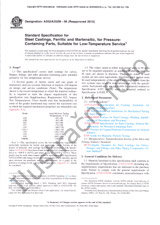Potřebujeme váš souhlas k využití jednotlivých dat, aby se vám mimo jiné mohly ukazovat informace týkající se vašich zájmů. Souhlas udělíte kliknutím na tlačítko „OK“.
ASTM E2021-15(2023)
Standard Test Method for Hot-Surface Ignition Temperature of Dust Layers
Přeložit název
NORMA vydána dne 1.5.2023
Informace o normě:
Označení normy: ASTM E2021-15(2023)
Datum vydání normy: 1.5.2023
Kód zboží: NS-1144157
Počet stran: 10
Přibližná hmotnost: 30 g (0.07 liber)
Země: Americká technická norma
Kategorie: Technické normy ASTM
Kategorie - podobné normy:
Anotace textu normy ASTM E2021-15(2023) :
Keywords:
dust layer ignition, hot surface ignition, ignition temperature,, ICS Number Code 13.230 (Explosion protection)
Doplňující informace
| Significance and Use | ||||||||||
|
5.1?This test method is applicable to dusts and powders, and provides a procedure for performing laboratory tests to evaluate hot-surface ignition temperatures of dust layers. 5.2?The test data can be of value in determining safe operating conditions in industrial plants, mines, manufacturing processes, and locations of material usage and storage. 5.3?Due to variation of ignition temperature with layer thickness, the test data at one thickness may not be applicable to all industrial situations (see Appendix X1). Tests at various layer thicknesses may provide a means for extrapolation to thicker layers, as listed in the following for pulverized Pittsburgh bituminous coal dust (2). Mathematical modeling of layer ignition at various layer thicknesses is described in Ref.
5.4?This hot plate test method allows for loss of heat from the top surface of the dust layer, and therefore generally gives a higher ignition temperature for a material than Test Method E771, which is a more adiabatic system. 5.5?This test method for dust layers generally will give a lower ignition temperature than Test Method E1491, which is for dust clouds. The layer ignition temperature is determined while monitoring for periods of minutes to hours, while the dust cloud is only exposed to the furnace for a period of seconds. Note 1:?Much of the literature data for layer ignition is
actually from a basket in a heated furnace (4), known as the modified
Godbert-Greenwald furnace test. Other data are from nonstandardized
hot plates 5.6?Additional information on the significance
and use of this test method may be found in Ref. (10).
|
||||||||||
| 1. Scope | ||||||||||
|
1.1?This test method covers a laboratory procedure to determine the hot-surface ignition temperature of dust layers, that is, measuring the minimum temperature at which a dust layer will self-heat. The test consists of a dust layer heated on a hot plate.2,3 1.2?Data obtained from this test method provide a relative measure of the hot-surface ignition temperature of a dust layer. 1.3?This test method should be used to measure and describe the properties of materials in response to heat and flame under controlled laboratory conditions and should not be used to describe or appraise the fire hazard or fire hazard risk of materials, products, or assemblies under actual fire conditions. However, results of this test method may be used as elements of a fire risk assessment that takes into account all of the factors that are pertinent to an assessment of the fire hazard risk of a particular end use product. 1.4?The values stated in SI units are to be regarded as standard. No other units of measurement are included in this standard. 1.5?This standard does not purport to address all of the safety concerns, if any, associated with its use. It is the responsibility of the user of this standard to establish appropriate safety, health, and environmental practices and determine the applicability of regulatory limitations prior to use. 1.6?This international standard was developed in accordance with internationally recognized principles on standardization established in the Decision on Principles for the Development of International Standards, Guides and Recommendations issued by the World Trade Organization Technical Barriers to Trade (TBT) Committee. |
||||||||||
| 2. Referenced Documents | ||||||||||
|




 Cookies
Cookies
